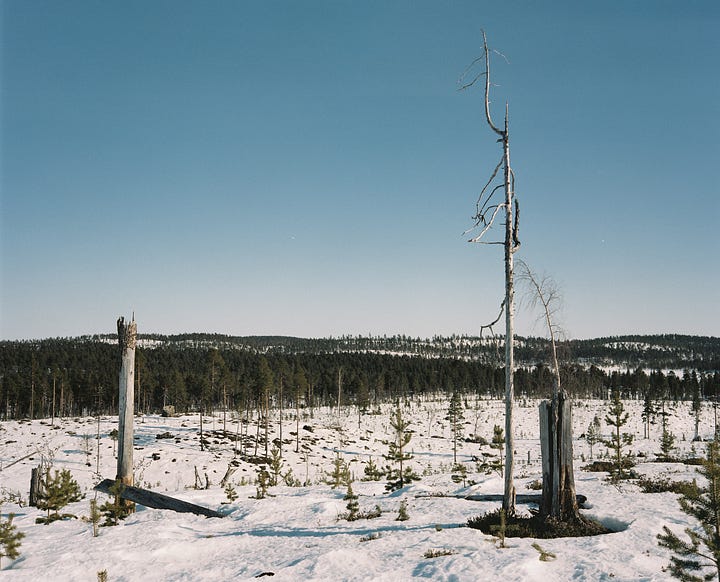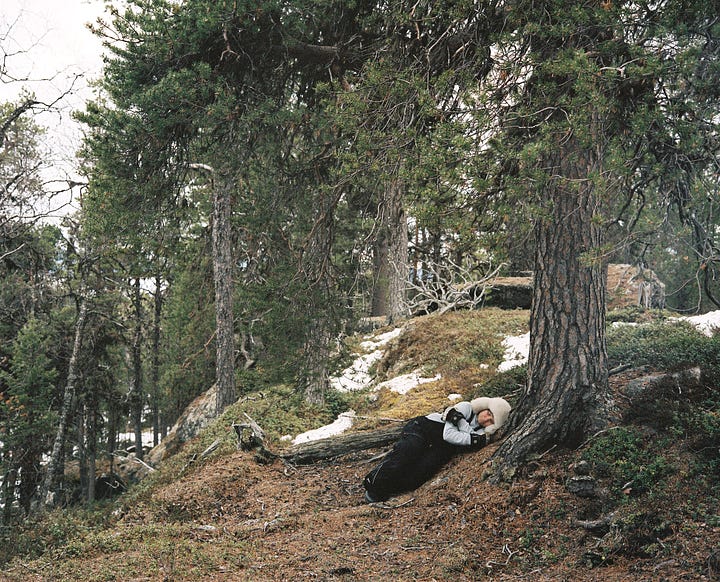“Sometimes a key arrives before the lock. Which I understood as a reminder to pay attention to my surroundings. That hidden in plain sight I might discover the key I do not yet know I need, but will help me cross an important threshold somewhere down the line.”
—Elizabeth Rush “Rising: Dispatches from the New American Shore”
Rilke’s “Letters to a Young Poet” sits in a primary position on my desk. It doesn’t beckon me to read it, it is not well worn. It is a book that lies next to a binder that contains a play I’ve been writing since 2019, a piece of work ignited by a relationship when its sails were ripped by a harsh, angry storm. I tentatively called upon Rilke in 2023 during the last months of a foreboding end to another attempt at love. That July, my dimmed light within, fighting for its embers to be fanned, was pulling in objects and experiences, reminding me of something lost, abandoned. A half read book moving to the top of the pile, a claustrophobic swim in the drowning depths of a familiar ocean, a pen meeting the blank page as tear drops dusted against seemingly foreign words. Reclamation met with the screaming shame of previous self abandon.
Last weekend I had lunch with one of my mentors - a leading human rights activist I met in my 20’s. And now as I approach my 40’s, I’m awakening to the wisdom that mentors are not teachers on pedestals, they are our dearest friends who are unafraid to gently walk and light the path ahead. So, as friends, we communed. We spoke about a shared cause: promoting women climate activists on the frontlines; how to engender a remembrance of our innate interdependence with Mother Earth, a fundamental rebalancing and healthy co-joining of masculine and feminine forces and energies.
Truth resides in the shape of nature’s fractals: our conversation opened to the personal. I shared: I ended a brief relationship last week because the person I was getting to know perceived my animism as an unscalable future threat to their idea of intimacy between two. Assumptions and judgements precluded questions and curiosity. The object of judgement is unironically where I learn how to find inner resolve. It is fundamentally through the wisdom of plants that I learnt if the judgment stings, it is a ripe opportunity for further self inquiry. A word-filled, hurt-filled dart may very well have struck a wound ready to be healed. Within the depths of inquiry, questions release potent alchemy: What would it feel like if our innate connectedness to earth and our inner knowing of the divine’s existence in everything were not seen as a threat nor competition? What does it require of ourselves to not love another as our perceived compliment, but to love someone as who they wholly are?
For our forthcoming documentary Natura, my friend Nichole Sobecki and I traveled from the Arctic to the Sahara inquiring about these dynamics through the lens of another relationship: that of mother and child. Our first trip became a guiding light for the whole film. We were graciously invited by Sámi climate activist, artist and mother Paulina Feodoroff to visit her community in Inari, Finland - the capital of the the last indigenous tribe in Northern Europe, the traditional reindeer herders and guardians of the arctic forests. For the first few days we didn’t meet Paullina in person. Gently lighting the path ahead of us, she encouraged us to go into the woods on our own and ask for permission to be and work on the land. That night, in a small log cabin many miles from the nearest person, Nichole and I woke up to the Northern Lights blazing the sky. In the ensuing days, Pauliina’s friend, Greenpeace leader Jarmo Pyykkö, took us on the back of a sleigh as we witnessed the devastating clear cutting of what are known as our “lungs of the North.” On day four we met Pauliina in person, deep in her snow covered forest sitting under the preserved Mother Tree.


At the center of a healthy forest stands a Mother Tree: an old-growth matriarch that provides nutrients to trees of all different ages and species through a vast, intelligent underground network. In the presence of the matriarch, we asked Pauliina how do we imagine a path forward. She suggested that mother nature will always adapt even in the face of great human led destruction, but it is our species that may very will loose its way beyond a point of return. A fundamental pillar of protecting our environment is how we nurture each other and our kin. The gift of reforestation is for the next generation to not loose their connection to Mother Earth, so that that may become nature’s strongest allies and guardians. For this, Pauliina embodies her lifelong activism patiently, fearlessly and humbly through the model of the Matriarchy. Akin to asking us to pause and connect with the land, she advised us that the Matriarchy is something to be felt versus explained:
“You can show it or live through it, but to try to vocalize it in a manner that it would be meaningful, I find it extremely hard, but I consider matriarchy to be a system where everybody leads and nobody leads. It's a network of interrelations where everybody is connected and dependent on each other. If we consider patriarchy to be a system that is a hierarchy, where there's one or a few who are making the decisions, who are leading, and the rest of the bunch are in different layers or different classes and are the ones who are obeying: then the matriarchy as a system is where different layers do exist and different places do exist, but there's an ongoing dialogue or communication, a negotiation about whether I'm not or I'm able to grow here, whether or not I'm able to exist here, whether or not we will do something together or not. And it's not only human beings, but other forms existing as well.”
What a world. Where negotiation isn’t transactional, where process teaches goal, where questions are the answer, where multiplicity is unity. Where we aren’t under duress negotiating the terms of love, but from the ecosystem of love, we negotiate our own path forward.
A day after I met with my friend for lunch, I received an invite to a theatrical reimagining of Rilke’s “Letters to a Young Poet.” What my weary heart couldn’t finish reading alone, was offered communally through verse. Rilke writes to a young man who is questioning how to keep his sense of self illuminated while in relationship to another. Rilke identifies that in our impatient youth, and into adulthood if we are stuck in the loop of patterning, there is a propensity to: “..Fling (ourselves) at one another when love comes over (us), scatter (ourselves) just as (we) are in all (our) troubledness, disorder, confusion … But what can come of that? What is life supposed to do with this heap of half-broken things that (we) call (our) togetherness and would like to call (our) happiness, were it possible, (our) future?”
Truth resides in the shape of nature’s fractals. I admittedly was surprised to hear Rilke’s writings from the early 20th century not only proffered the importance of becoming comfortable with our own solitude as a salve to toxic enmeshment, but the inherent importance of recognizing and restoring feminine, earthly autonomy. That the future relationship is based on the matriarchal model where everybody leads and nobody leads. In doing so, he honors women’s innate bodily connectedness to mother earth (what interests me here is the poetics on progress, a map for the way through, not any perceived superiority between the sexes):
Women, in whom life abides and dwells more immediately, more fruitfully and more trustingly, are bound to have ripened more thoroughly, become more human human beings, than a man, who is all too light and has not been pulled down beneath the surface of life by the weight of a bodily fruit and who, in his arrogance and impatience, undervalues what he thinks he loves. This humanity which inhabits woman, brought to term in pain and humiliation, will, once she has shrugged off the conventions of mere femininity through the transformations of her outward status, come clearly to light, and men, who today do not yet feel it approaching, will be taken by surprise and struck down by it…This step forward (at first right against the will of the men who are left behind) will transform the experience of love, which is now full of error, alter it root and branch, reshape it into a relation between two human beings and no longer between man and woman. And this more human form of love (which will be performed in infinitely gentle and considerate fashion, true and clear in its creating of bonds and dissolving of them) will resemble the one we are struggling and toiling to prepare the way for, the love that consists in two solitudes protecting, defining and welcoming one another.”
“Half-broken Things” is a time in my path when I was struggling to untangle from the lover’s victim-perpetrator paradigm. Struggling to find self accountability on the way to soul autonomy. Not yet knowing what roads I’d travel to reconnect parts within myself, parts yearning for repair, clarity and restored interdependence with all things. And so here I share the rockiest part of that journey. Poems called forth by words whispered in an eerily, calm and existential manner to my ex: “I don’t know if we are living a half-life or double lives.” Words that foretold a future threshold crossing: the abyss from living half-broken lives to full autonomous lives. The key that arrived before the lock.
Half-broken Things (2019-2021)










